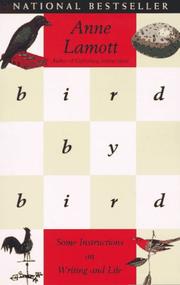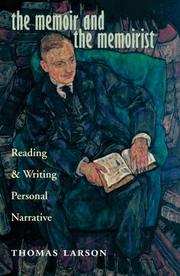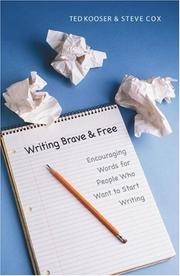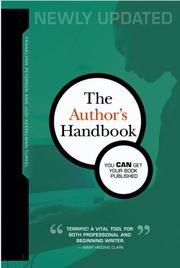| Listing 1 - 10 of 3162 | << page >> |
Sort by
|
Book
ISBN: 1423799496 158511667X 9781423799498 Year: 2007 Publisher: Chicago : Institute For Career Research,
Abstract | Keywords | Export | Availability | Bookmark
 Loading...
Loading...Choose an application
- Reference Manager
- EndNote
- RefWorks (Direct export to RefWorks)
Do you idolize Stephen King? Are your fantasies filled with scenes of writing the Great American Novel, maybe being revered as the next Steinbeck or Morrison? Would you rather clutch a Pulitzer than an Emmy any day?. Writing has a reputation, deserved or not, for being a dream job. At a party, if someone asks an author what they do for a living, the answer is likely to cause eyes to glaze over and jaws to drop in awe. There is just something about the idea of spending your life serenely turning out exquisitely crafted prose that's appealing. Yet most people haven't a clue what a writer's life
Book
ISBN: 1408175207 9781408175200 9781408131237 1408131234 Year: 2012 Publisher: London Bloomsbury Publishing
Abstract | Keywords | Export | Availability | Bookmark
 Loading...
Loading...Choose an application
- Reference Manager
- EndNote
- RefWorks (Direct export to RefWorks)
The Arvon Book of Literary Non-Fiction is an essential guide to writing in a wide range of genres, from travel writing to feminist polemic and writing on nature, history, death, friendship and sexuality. Part 1 explores the full range of genres and asks the question: what is literary non-fiction? Part 2 includes tips by such bestselling literary non-fiction writers as: Lisa Appignanesi, Rosemary Bailey, Gillian Beer, Bidisha, Lizzie Collingham, William Dalrymple, Stevie Davies, Colin Grant, Rahila Gupta, Philip Hoare, Siri Hustvedt, Alice Kessler-Harris, Barry Lopez, Richard Mabey, Robert Macf
Book
ISBN: 1421425092 9781421425092 9781421425085 1421425084 Year: 2018 Publisher: Baltimore, Maryland
Abstract | Keywords | Export | Availability | Bookmark
 Loading...
Loading...Choose an application
- Reference Manager
- EndNote
- RefWorks (Direct export to RefWorks)
Cover -- Half Title -- Title -- Copyright -- Dedication -- CONTENTS -- INTRODUCTION -- ELEMENTS OF FINE WRITING -- PURPOSE OF THE NOTEBOOK -- Goal, Quest, Story -- CHANCE PARTICULARS -- Use of the Senses -- Specificity, Precision, and Concrete Detail -- PLACE -- Landscape and Nature -- Towns, Streets, and Buildings -- PEOPLE -- Portraits and Interviews -- Encounters, Observations, and Activities -- FACTS, HISTORY, AND CULTURE -- Basic Facts, History, and Cultural Observations -- TECHNICAL AND OTHER PERTINENT INFORMATION -- Informational Notes -- CHRONICLE -- Record of Daily Activities and Travels -- PERSONAL RESPONSES -- Feelings and Contemplations -- COMMONPLACE NOTES: PERSPECTIVES OF OTHERS AND MISCELLANEA -- Quotations and Thoughts from Experts, Scholars, and Literary Forebears-and Other Miscellanea -- ASSOCIATIONS AND FIGURATIVE LANGUAGE -- Metaphor and Simile -- REFLECTIONS -- Thoughts and Musings -- WRITING NOTES -- ACKNOWLEDGMENTS -- APPENDIX
Book
ISBN: 0830865659 9780830865659 9780830845699 Year: 2019 Publisher: Downers Grove, Illinois
Abstract | Keywords | Export | Availability | Bookmark
 Loading...
Loading...Choose an application
- Reference Manager
- EndNote
- RefWorks (Direct export to RefWorks)
Writing is not easy. But it can get better. In this primer on nonfiction writing, Andrew Le Peau offers insights he has learned as a published author and an editor for over forty years, training, guiding, and cheering on hundreds of writers. Here are skills that writers can master--from finding strong openings and closings, to focusing on an audience, to creating a clear structure, to crafting a persuasive message. With wide-ranging examples from fiction and nonfiction, Le Peau also demystifies aspects of art in writing such as creativity, tone, and metaphor. He considers strategies that can move writers toward fresher, more vital, and perhaps more beautiful expressions of the human condition. One aspect of writing that rarely receives attention is who we are as writers and how writing itself changes us. Self-doubt, fear of criticism, downsides of success, questions of authority, and finding our voice are all a part of the exploration of our spirituality as writers found in these pages. Discover how the act of writing can affect our life in God. Whether you're a veteran writer, an occasional practitioner, a publishing professional, or a student just starting to explore such skills, Le Peau's wit and wisdom can speed you on your way.
Book
Year: 2017 Publisher: London : Ubiquity Press,
Abstract | Keywords | Export | Availability | Bookmark
 Loading...
Loading...Choose an application
- Reference Manager
- EndNote
- RefWorks (Direct export to RefWorks)
"Publishing Addiction Science is a comprehensive guide for addiction scientists facing the complex process of contributing to scholarly journals. Written by an international group of addiction journal editors and their colleagues, it discusses how to write research articles and systematic reviews, choose a journal, respond to reviewers' reports, become a reviewer, and resolve the often difficult authorship, ethical and citation issues that arise in addiction science publishing. As a "Guide for the Perplexed," Publishing Addiction Science helps novice as well as experienced researchers to deal with these challenges. It is suitable for university courses and forms the basis of the training workshops offered by the International Society of Addiction Journal Editors (ISAJE). Co-sponsored by ISAJE and the scientific journal Addiction, the third edition of Publishing Addiction Science gives special attention to the challenges faced by researchers from developing and non-English-speaking countries and features new chapters on guidance for clinician-scientists and the growth of infrastructure and career opportunities in addiction science.".
Periodical
Year: 2011 Publisher: [Ghent] : [Ghent University],
Abstract | Keywords | Export | Availability | Bookmark
 Loading...
Loading...Choose an application
- Reference Manager
- EndNote
- RefWorks (Direct export to RefWorks)

ISBN: 0385480016 Year: 1995 Publisher: New York Anchor Books
Abstract | Keywords | Export | Availability | Bookmark
 Loading...
Loading...Choose an application
- Reference Manager
- EndNote
- RefWorks (Direct export to RefWorks)

ISBN: 9780804011013 080401101X 9780804011006 0804011001 080404029X 9780804040297 Year: 2007 Publisher: Athens, Ohio
Abstract | Keywords | Export | Availability | Bookmark
 Loading...
Loading...Choose an application
- Reference Manager
- EndNote
- RefWorks (Direct export to RefWorks)
The memoir is the most popular and expressive literary form of our time. Writers embrace the memoir and readers devour it, propelling many memoirs by relative unknowns to the top of the best-seller list. Writing programs challenge authors to disclose themselves in personal narrative. Memoir and personal narrative urge writers to face the intimacies of the self and ask what is true. In The Memoir and the Memoirist, critic and memoirist Thomas Larson explores the craft and purpose of writing this new form. Larson guides the reader from the autobiography and the personal essay to the memoir-a g
Autobiography --- Authorship. --- Authorship

ISBN: 0803276966 128042396X 9786610423965 0803253982 9780803253988 9781280423963 9780803276963 0803227809 9780803227804 0803278322 9780803278325 0803227809 9780803227804 0803278322 9780803278325 Year: 2006 Publisher: Lincoln University of Nebraska Press
Abstract | Keywords | Export | Availability | Bookmark
 Loading...
Loading...Choose an application
- Reference Manager
- EndNote
- RefWorks (Direct export to RefWorks)
Authorship. --- Authoring (Authorship) --- Writing (Authorship) --- Literature

ISBN: 1282270044 9786612270048 0299214834 9780299214838 0299214842 9780299214845 9781282270046 6612270047 Year: 2006 Publisher: Madison University of Wisconsin Press
Abstract | Keywords | Export | Availability | Bookmark
 Loading...
Loading...Choose an application
- Reference Manager
- EndNote
- RefWorks (Direct export to RefWorks)
Authorship. --- Authoring (Authorship) --- Writing (Authorship) --- Literature
| Listing 1 - 10 of 3162 | << page >> |
Sort by
|

 Search
Search Feedback
Feedback About UniCat
About UniCat  Help
Help News
News